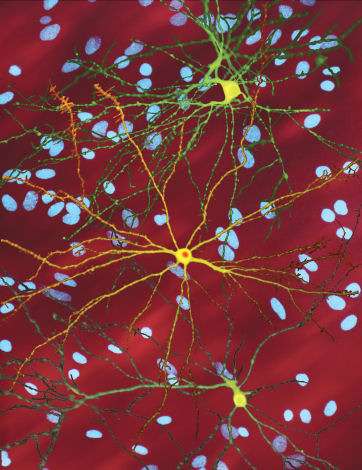New study puts focus on early symptoms of Huntington's disease

Psychiatric and cognitive symptoms emerge at an early stage in Huntington's disease. However, research so far has mainly focused on movement impairment, a symptom associated with the more advanced stages of the disease. A new study from Lund University in Sweden now shows that the emotional brain—the limbic system—is affected earlier in the course of the disease, and should therefore be given more attention in the development of new treatments.
Huntington's is a fatal illness with no treatment to slow its course. The new research findings provide knowledge about where the early changes take place in the brain. This is important for the development of new treatments which, according to the researchers, should target the earliest disease-related changes.
"Our results show that the emotional brain is affected at an early stage, and that this can contribute to the development of psychiatric and cognitive symptoms, which are the most difficult for the patients and their relatives. It is not only nerve cells that are affected, but also other cells, oligodendrocytes, which enable communication between different parts of the brain, that are affected early in the course of the disease", explains Åsa Petersén, professor of neuroscience at Lunds University and senior consultant in psychiatry at the Huntington Centre in Lund.
Huntington's disease is caused by a known genetic mutation that results in the production of a protein known as mutant huntingtin in all the cells of the body. However, only certain cells are very sensitive to the protein mutation and these are in specific areas of the brain.
"It is still a mystery why certain cells are sensitive to the protein mutation and why the disease starts to break out at a certain time, even though it was there all along. However, our study shows for the first time that changes in the oligodendrocytes in the emotional brain are expressed in the brains of individuals suffering from Huntington's disease", says researcher and first author of the study, Sanaz Gabery.
The researchers believe that previous research focused too much on the typical movement impairments associated with Huntington's disease and the link to effects on the movement control center.
"The emotional brain and cells other than just nerve cells are affected by the development of Huntington's disease. The nerve-fiber system in the emotional brain is already reduced before the typical movement impairments emerge. The changes consist of damage to myelin, i.e. the insulation system in the white matter of the brain, which is important for information transfer, and an effect on genes that are important for oligodendrocytes' identity and function", explains Åsa Petersén.
"Today, many researchers are focused on reducing the levels, and thereby the effect, of the disease-inducing mutant huntingtin in the nerves cells and in the brain's movement control center. But our findings indicate that there is also a need to examine the white matter in the emotional brain. Why are oligodendrocytes sensitive to mutant huntingtin? Is it possible to slow down Huntington's disease by affecting the changes that we have identified?"
More information: Sanaz Gabery et al, Early white matter pathology in the fornix of the limbic system in Huntington disease, Acta Neuropathologica (2021). DOI: 10.1007/s00401-021-02362-8
















